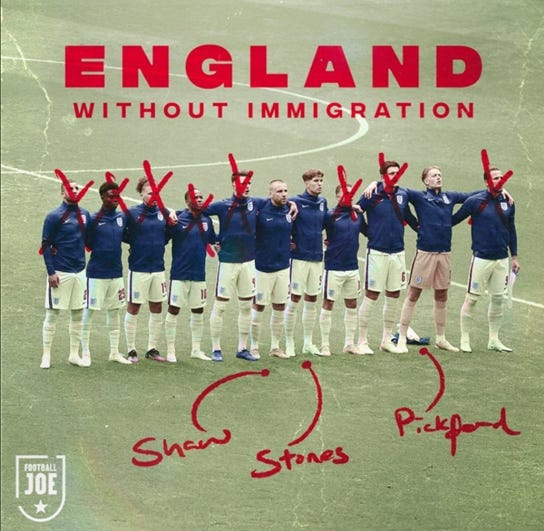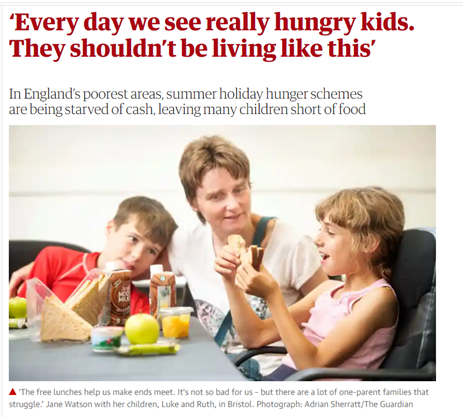Here in England, it has been all about the football these past few weeks as you can imagine. Many have commented rightly on the huge diversity of the England team, and their stance on racism has given us something to be truly proud of. For some time now, the team has been kneeling at the beginning of matches to protest racism, something that was described by the Home Secretary as ‘gesture politics’. The Home Secretary, Priti Patel, herself a daughter of Ugandan Indian parents, said fans had a ‘right’ to boo England players for taking a stand against racism. She then went on to tweet her undying support for the England team.
After England lost on penalties to Italy on Sunday evening, the social media accounts of players including Marcus Rashford, Bukayo Saka and Jadon Sancho, who missed their penalties, were flooded with abuse including monkey emojis and vile racist slurs. This in turn caused a public outcry and huge demonstration of support for the three young men. The Prime Minister and the Home Secretary rushed to denounce this racism, and many, including Tyrone Mings, one of the England players pointed out that she had “stoke(d) the fire”.
Depressing though the incident was, as one friend said at least it showed many in England that racism is a serious issue in our society, something many deny; and the outcry in support of the players was truly moving.
What is also clear is that a number of the members of the team come from very poor working-class backgrounds. And of course, class and race are hugely interconnected. Marcus Rashford grew up in a single parent household where his mum sometimes had to skip meals to make sure her kids were fed. Raheem Sterling also grew up in a single parent family in London after the murder of his father when he was very young. Rashford has campaigned successfully for free school meals for children in the UK. He speaks often of his experience of hardship growing up and how common sadly it is in modern Britain. Currently over a million people in the UK have to use food banks and hunger is common. In my kids school where we live in London, a number of children struggle with having enough food at home with parents still regularly going hungry so their children can eat, just as Marcus’s mum did for him.
I think what this also shows is just how rare it is to see working class and black people having a voice in our popular culture and media here in the UK. In the same way as both gender and race, class suffers in two ways in terms of representation. When working class people are represented in the media, all to often these are deeply negative and patronising representations, that only serve to reinforce prejudice.
More often though they are simply ignored all together. Stories are simply never told. Voices are never heard. Just as our dominant culture narrative and story is both white and male, it is consistently dominated by the upper-middle classes.
Some might think this is a uniquely English thing, our obsession with class; but my experience is that this is an issue in many countries all over the world. It would be great to know if others concur. Other countries may not use the class word so much, but their cultural and media life is still very much dominated by the perspectives and views of the upper middle classes, who are hugely overrepresented. And this in turn means the views and opinions of those at the bottom are routinely ignored. And if they are not ignored, they are talked about through a prism of prejudice, and do not get to talk themselves.
I remember being in a big workshop in Malawi some years ago with lots of senior civil servants, businesspeople, and donor representatives. We were all put into groups and asked to brainstorm and then vote for the top three reasons for poverty in Malawi. Much to the horror of the well-meaning facilitators ‘laziness’ was voted number two.
The mind boggles to think of the multitude of stories that are simply never told, and the lies and misrepresentation that is. The voices of those young football players, and their experiences of racism and poverty have massively enriched our national debate here in the UK on these issues in recent months. Imagine this were the case all the time. That you did not need to be an incredible footballer to have your voice and your views heard on the national stage as a young black man who grew up poor. How much deeper and honest our national conversations would be, and how much harder it would be for governments like our current UK one to blame the poor for their problems yet again.
Have great weekends everyone!
Cheers,
Max
Max is the Head of Inequality Policy at Oxfam International & EQUALS Podcast co-host. He is also Chair of the global People’s Vaccine Alliance.
Image Credits
Featured image Source: SibsMUFC/Twitter
Covering Rashford’s defaced mural: Source: FootballJoe/Instagram
Image Screenshot “Every day we see hungry kids…”. Source: https://www.theguardian.com/society/2019/aug/14/uk-holiday-hunger-schemes-deprived-children-summer




